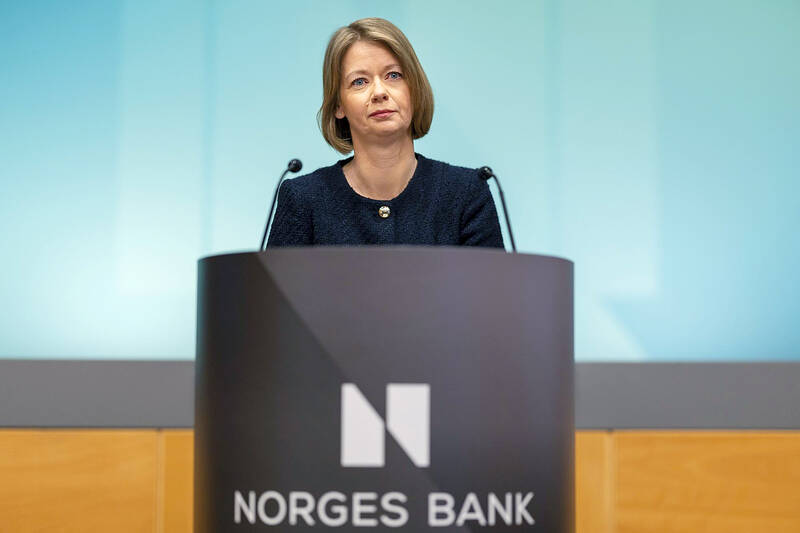Norway’s central bank paused monetary tightening while signaling that a likely quarter-point increase in borrowing costs in March is needed to bring inflation under control.
It kept the key deposit rate on hold at 2.75 percent yesterday, as forecast by a majority of economists in a Bloomberg survey.
Norges Bank Governor Ida Wolden Bache said the benchmark “will most likely be raised in March,” an outlook that would chime with guidance last month that the key interest rate should increase to “around 3 percent” this year.

Photo: Bloomberg
“The policy rate will need to be increased somewhat further,” officials said.
Even so, the rate “has been raised considerably over a short period of time, and monetary policy has started to have a tightening effect on the economy. This may suggest a more gradual approach to policy rate setting,” they said.
The krone pared losses after the decision, trading 0.4 percent weaker at about 10.72 against the euro as of 9:30am in London.
Norway’s currency has weakened 7 percent over the past 12 months versus the euro, the biggest depreciation among G10 peers together with the Swedish krona.
Traders trimmed bets on rate hikes by June to 54 basis points, the lowest in more than a month, according to forward-rate agreements.
The decision does not give any clear indication on whether Norway might be among the first in the G10 sphere of major currency jurisdictions to end monetary tightening, after it led that group to start rate hikes in September 2021.
Marius Gonsholt Hov, an analyst at Svenska Handelsbanken AB in Oslo, said he believes the peak is at hand.
“Norges Bank will deliver another 25 basis-point rate hike in March, to 3 percent, but that is also the peak in our view,” Gonsholt Hov said. “Further ahead, we believe that Norges Bank will stick to 3 percent for the remainder of this year, to be sure that inflationary pressures are in fact abating.”
In contrast, Nordea Bank Abp’s Kjetil Olsen and Dane Cekov continue to forecast a last hike to 3.25 percent in June after a March move, saying they “still think developments in the economy going forward will be slightly better” than the central bank forecasts, “and there is also upside risk to wage growth.”
With inflation slowing to a seven-month low and the fossil-fuel-rich economy facing a mild recession, the central bank has adopted a more cautious stance just as the government also considers a slowdown in inflation to be its key priority.
If Norway does conclude rate hiking in coming months, it would not be the only one among other advanced economies. Australia and Canada have also signaled they are nearing an end to rate hikes.
Officials at the European Central Bank are pondering whether to start slowing down in due course even as it has indicated more increases in borrowing costs.
The announcement did not feature new economic forecasts or projections for rates, as the decision was a so-called interim one.

Taiwan Transport and Storage Corp (TTS, 台灣通運倉儲) yesterday unveiled its first electric tractor unit — manufactured by Volvo Trucks — in a ceremony in Taipei, and said the unit would soon be used to transport cement produced by Taiwan Cement Corp (TCC, 台灣水泥). Both TTS and TCC belong to TCC International Holdings Ltd (台泥國際集團). With the electric tractor unit, the Taipei-based cement firm would become the first in Taiwan to use electric vehicles to transport construction materials. TTS chairman Koo Kung-yi (辜公怡), Volvo Trucks vice president of sales and marketing Johan Selven, TCC president Roman Cheng (程耀輝) and Taikoo Motors Group

Among the rows of vibrators, rubber torsos and leather harnesses at a Chinese sex toys exhibition in Shanghai this weekend, the beginnings of an artificial intelligence (AI)-driven shift in the industry quietly pulsed. China manufactures about 70 percent of the world’s sex toys, most of it the “hardware” on display at the fair — whether that be technicolor tentacled dildos or hyper-realistic personalized silicone dolls. Yet smart toys have been rising in popularity for some time. Many major European and US brands already offer tech-enhanced products that can enable long-distance love, monitor well-being and even bring people one step closer to

RECORD-BREAKING: TSMC’s net profit last quarter beat market expectations by expanding 8.9% and it was the best first-quarter profit in the chipmaker’s history Taiwan Semiconductor Manufacturing Co (TSMC, 台積電), which counts Nvidia Corp as a key customer, yesterday said that artificial intelligence (AI) server chip revenue is set to more than double this year from last year amid rising demand. The chipmaker expects the growth momentum to continue in the next five years with an annual compound growth rate of 50 percent, TSMC chief executive officer C.C. Wei (魏哲家) told investors yesterday. By 2028, AI chips’ contribution to revenue would climb to about 20 percent from a percentage in the low teens, Wei said. “Almost all the AI innovators are working with TSMC to address the

Malaysia’s leader yesterday announced plans to build a massive semiconductor design park, aiming to boost the Southeast Asian nation’s role in the global chip industry. A prominent player in the semiconductor industry for decades, Malaysia accounts for an estimated 13 percent of global back-end manufacturing, according to German tech giant Bosch. Now it wants to go beyond production and emerge as a chip design powerhouse too, Malaysian Prime Minister Anwar Ibrahim said. “I am pleased to announce the largest IC (integrated circuit) Design Park in Southeast Asia, that will house world-class anchor tenants and collaborate with global companies such as Arm [Holdings PLC],”